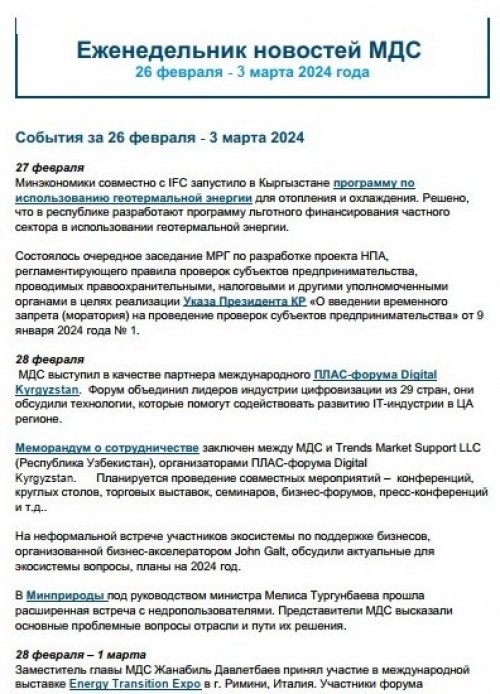Analysis /
Articles /
Employment of foreign specialists needs to be simplified in Kyrgyzstan
The State Migration Service under the Kyrgyz Government has proposed amendments to the law “On Foreign Migration” in order to protect the domestic labor market.
Introducing a quota
According to the amendments, employment of foreign workers should be based on a quota set for each business entity within the overall quota determined annually by the Government.
The Migration Service proposes to divide foreign employees into four categories: highly qualified foreign specialists (HQS), foreign specialists, foreign unskilled workers, and foreign private entrepreneurs.
Highly qualified foreign specialists shall be allowed to work for up to three years at the request of employers, without the quota for labor migration.
Foreign specialists are allowed to work for up to one year at the request of employers, within the quota for labor migration, and their number should not exceed 20% of the total number of employees in a company.
Foreign unskilled workers will get a work permit for up to one year at the request of their employers, within the quota for labor migration, and their number should not exceed 10% of the total number of employees in a company.
Foreign private entrepreneurs will be allowed to work for up to one year according to their job applications within the quota for labor migration and with a patent issued by Kyrgyzstan’s tax authority.
The bill also proposes increasing of the state duty. Currently, foreign personnel involved in local enterprises have to pay a state duty of 2,000 soms, and the rates have not been changed since 1996. The government proposes to increase it, to bring in additional money to the state budget.
Opinions
MP Kojobek Ryspaev opposes the initiative of the State Migration Service. He believes that restrictions on employment of foreign specialists will hinder the activity of foreign companies in Kyrgyzstan. The MP recalled the situation when the Junda oil refinery started operating in the Chui province. The Government allowed the Chinese company to have 80% of the workers from among Chinese citizens during the first six months of its operation, because all the equipment was Chinese. The number of foreign employees has later been reduced to 10% after Chinese experts have trained local staff.
"We have to create favorable conditions to attract investors, and they in turn will provide jobs to locals. What investors should do if they need their own engineers to setup equipment but their number exceeds the quota?" Ryspaev asked the authors of the bill.
MPs also believe that the bill creates opportunities for corruption, as it does not clearly indicate who should determine the level of qualification of foreign specialists and what the criteria.
The Government should not charge a fee for issuing permits for the use of foreign labor because entrepreneurs create added value and jobs, MP Azamat Arapbaev says. The Migration Service is the regulator of the labor market and migration processes, not the authority in charge for replenishing the state budget, he added.
The MP also proposed refusing from foreign labor quotas, as the annual quotas approved by the Government have never been fulfilled. Moreover, the past quotas have mainly been set in favor of unskilled labor.
Arapbaev supports the proposal to limit the number of foreign workers in each company, as it replaces the need for a quota and prevents excessive employment of foreigners.
MPs also proposed to allow foreign investors to use foreign employees if there are no qualified specialists in this particular area in Kyrgyzstan.
Another bill
There is another bill with amendments to the law “On Foreign Migration”, drafted by the Investment Promotion and Export Agency under the Kyrgyz Ministry of Economy with the participation of the International Business Council (IBC) based in Bishkek. The bill was submitted to Parliament but it has not been discussed yet.
The current system of issuing permits for foreign labor is opaque and inefficient and does not encourage the inflow of highly qualified specialists to the country, the authors of the bill say.
According to IBC lawyer Ulukbek Turdubekov, the new bill proposes introducing the category of highly qualified specialists (HQSs) and legally defining their three main criteria: higher education, work experience and wages. The current law does not contain a clear definition of this category of workers.
Employers should assess the qualification level of foreign citizens they want to employ as highly qualified specialists, and thus carry risks on their own, the bill’s authors believe. They also propose canceling compulsory permits for hiring foreign employees.
“The State Migration Service proposes to set a migration quota at 10% and 20% while we propose to remove all restrictions. If employers deem it necessary to hire employees, let them act according to their own discretion. In addition, investors should fulfill their obligations before Kyrgyzstan to create new jobs,” the IBC lawyer explains.
For instance, only 3% of full-time employees of the Kumtor Gold Company are foreigners while the others are citizens of Kyrgyzstan, and their share in the company's staff is growing as the foreign managerial personnel have been gradually replaced with local employees, the company said.
The current law on foreign migration does not take into consideration the needs of businesses and the importance of attraction of foreign specialists to the country.
The authors of both bills and the MPs should combine the best ideas of the two versions and create a single effective instrument to facilitate the work of foreign companies and thus contribute to the improvement of the investment climate in Kyrgyzstan.
http://www.timesca.com/index.php/news/17381-employment-of-foreign-specialists-needs-to-be-simplified-in-kyrgyzstan























